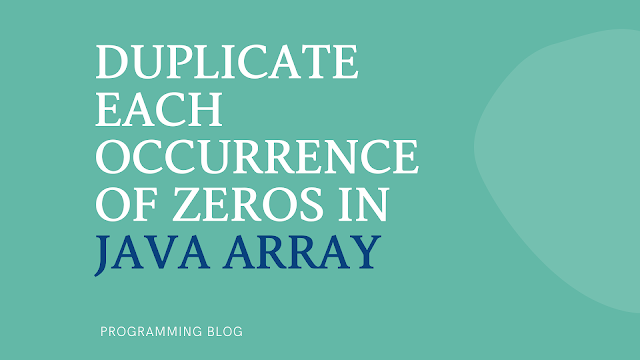Duplicate each occurrence of zero, shifting the remaining elements to the right in Java | LeetCode Problem
Problem Description :-
Given a fixed length array of integers, duplicate each occurrence of zero, shifting the remaining elements to the right.
Note that elements beyond the length of the original array are not written.
Do the above modifications to the input array in place, do not return anything from your function.
Example 1 :-
Input: [1,0,2,3,0,4,5,0] Output: null Explanation: After calling your function, the input array is modified to:
[1,0,0,2,3,0,0,4]
Example 2 :-
Input: [1,2,3] Output: null Explanation: After calling your function, the input array is modified to: [1,2,3]
Simply, if there is any 0 in array then we have to add another 0 in right of that array and shift all right value by 1. And array size remains same as old one.
Solution 1 :- Using for loop
class Solution {
public void duplicateZeros(int[] arr) {
for (int i=0; i<arr.length; i++) {
if (arr[i] == 0) {// Shift all values to right after finding 0
for (int j = arr.length-1; j > i; j--) {
arr[j] = arr[j-1];
}
i++;
}
}
}
}
Explanation :-
- Loop through given array using for loop.
- Check if particular array value is 0.
- If there is 0 in array then we again loop through array but from right side, and go until where 0 is found.
Example : array length is 6 and values are = [1 0 2 0 3 0] - First loop
- (i = 0, value = 1), No 0 found.
- (i = 1, value = 0), 0 is found. Go to Second Loop.
- (j = 5, value = 4) and (j > j, 5 > 1) So after Shift operation "arr[j] = arr[j-1]" array become
[1 0 2 0 3 3]. - (j = 4, value = 3) and (j > i, 4 >1) So after Shift operation array become
[1 0 2 0 0 3]. - (j = 3, value = 0) and (j > i, 3 >1) So after Shift operation array become
[1 0 2 2 0 3]. - (j = 2, value = 2) and (j > i, 2 >1) So after Shift operation array become
[1 0 0 2 0 3]. - (j = 2, value = 0) and (j > i, 1 >1) Means 1 is not greater than 1 so condition become fail and we duplicate 0 value and shift all value to the right after 0 value.
- So above code repeat until we complete array loop.
- After loop we again increment i by one so after duplicate 0, we get correct shifting.
Solution 2 :- Using While loop
int i = 0;
while(i < arr.length) {
if(arr[i] == 0) {
int j = arr.length-1;// Shift all value to right after finding 0
while(j != i) {
arr[j] = arr[j-1];
j--;
}
i = i+2;
}
else {
i = i+1;
}
}
Explanation :-
- First initialize i with 0.
- Loop until array length.
- If 0 is found then shift one value from right until i become j.
- After increment i by 2.
- If 0 is not found then increment i by 1.
Happy Coding.
Other articles you may like :-
- Counting Valleys HackerRank Solution in Java
- Find Squares of a Sorted Array in Java
- Find Numbers with Even Number of Digits in Java
- Java Generics HackerRank Solution

Comments
Post a Comment